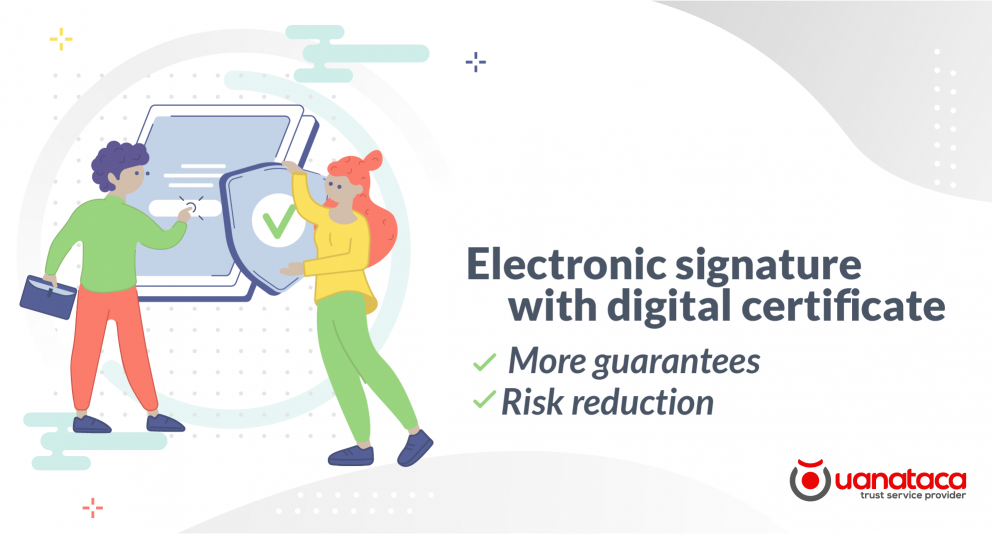
More and more companies are digitising their signature processes. However, having an electronic signature solution does not mean that you are using a digital certificate to sign.
The main difference between signing with a digital certificate and signing without one lies in the legal guarantees and evidentiary value. If you are wondering why it is safer to sign with a digital certificate, be sure to read this post to clear up some of the most frequent doubts.
Electronic signature and digital certificate are not the same thing: key differences you should know
Although the electronic signature and the digital certificate are interrelated concepts, it is important to know their differences in order to use them correctly and make the most of the advantages of using them together. First of all, it is interesting to define them and to know what their function is.
A digital certificate is a group of electronic data that allows the identification of its owner. An electronic signature is a legal concept and represents the acceptance of the content of a document or the conformity with an electronic transaction.
Once both terms have been defined, we will be able to better understand the main differences between the digital certificate and the electronic signature:
- A digital certificate is issued by a certification authority and requires a process of identification, authentication and validation of the owner. An electronic signature, on the other hand, only requires a technological solution that allows the signatory's consent to be expressed.
- The digital certificate identifies the owner, while the electronic signature only manifests the signatory's will, but does not always allow the signatory to be identified.
The key to understanding the difference between an electronic signature and a digital certificate lies in understanding their correspondence: a digital certificate allows electronic signatures to be made, but it is not essential to have a digital certificate in order to make electronic signatures.
HOW TO IDENTIFY A DIGITAL CERTIFICATE
✔️ It is an accreditation that allows authentication and signing of electronic documents.
✔️ It is issued by a certification authority.
✔️Identifies the owner and binds to the certificate
HOW TO IDENTIFY An electronic signature
✔️ A tool for signing electronic documents.
✔️ The electronic signature may or may not be based on a digital certificate.
✔️ It is not a credential to identify a person on the internet.
✔️ It is not possible to authenticate with it on e-platforms
How to maximise the legal guarantees of your e-signature and avoid unnecessary risks
In the previous section we have explained that it is not necessary to have a digital certificate to make an electronic signature. So, why use a digital certificate to electronically sign a document? Fundamentally because of the evidentiary quality.
When we use a digital certificate we reinforce the probative force of the electronic signature. This means that, in the event of litigation, those electronic signatures based on a digital certificate issued by a legally authorised authority will be subject to the favourable presumptions established in the electronic signature legislation.
In addition to the digital certificate, there are other factors that strengthen the evidentiary value and legal effect of the electronic signature, such as the type of signature used, the technology used to generate it and the entity in charge of providing it.
To understand how the type of electronic signature affects the evidentiary value, we must know that there are three types of electronic signature, regulated in Regulation (EU) No 910/2014, known as the eIDAS Regulation: simple electronic signature, advanced electronic signature and qualified electronic signature.
The simple electronic signature is the most basic of them all and its evidentiary quality is usually very basic. We are talking about signatures through actions as simple as entering a password, a pin, signing on a tablet, among others.
The next type of electronic signature is the advanced electronic signature, which can be based on a digital certificate or not. Its evidentiary quality is significantly strengthened, and the most secure way to reinforce its evidentiary force is through the use of digital certificates.
The third type of signature is the qualified electronic signature. It should be considered as the highest level of electronic signature and the most robust in its evidentiary quality. The use of a digital certificate is one of its requirements, which gives an idea of the role digital certificates play in electronic signatures.
When deciding on an e-signature solution, it is important to assess the risks. Only qualified e-signatures stand as full proof.
E-signature and digital certificate: the most advantages combination
The electronic signature and the digital certificate complement each other in such a way that their union maximises the legal guarantees and the robustness of their evidentiary quality. However, there are cases of actors - e.g. customers or suppliers - involved in everyday business activity who do not have a digital certificate. Does this mean, then, that companies should renounce maximum protection and risk the signatory disassociating himself from the electronic signature and the obligations undertaken? It does not have to.
Designed for these cases, Uanataca's One-Shot Signature solution makes it possible to sign any type of document with a digital certificate without the need to have one beforehand.

In addition to the guarantees of signing with a digital certificate, Firma One-Shot is a simple and intuitive solution that improves the user experience. The process is very simple: the service generates a digital certificate for the signatory, who can use it to sign all the documents included in a transaction. On the user's side, they only have to enter a code sent by SMS and the document is signed quickly, easily and securely.
In conclusion, the electronic signature is a tool that has proven to be very useful for increasing profitability, accelerating agreements and optimising workflows. When it is based on a digital certificate, the legal guarantees and its probative value increase, making it more difficult for the signatory to disassociate himself from the electronic signature and the obligations undertaken.